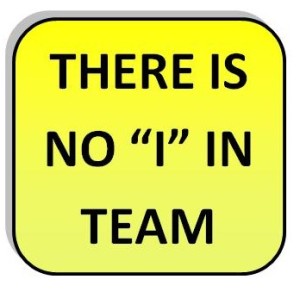Should I feel bad about getting someone fired

Today we discuss a very serious topic:
Should you as a worker feel bad for getting someone fired? Before starting let me add some context; we are talking here about someone who works in your same office or company. I also want to steer clear of purely vindictive mindsets who are looking for justification for their mean ways. Let us begin.
As a worker there are some basic expectations placed on you by your employer. For example, you are expected to be at work on pre-arranged days and work for the agreed upon hours
(and overtime where applicable). It does not matter if you are on a roster or shifts, attendance when you are expected is a must. Additionally, when given a set of tasks and responsibilities, you are expected to deliver in the time frame that has been stipulated. And if no time limit was given you are expected to work diligently until the tasks are complete. Routinely slacking off is totally unacceptable. The last dynamic worth mentioning is working with others. If the setting is one where team work is required, then you are expected to deal with whatever inter-personal issues outside of the office and get the job done.
With that foundation laid, it is safe to say that if a coworker is not meeting the expectations that have been set for him or her by management then their continued employment should be evaluated. If improvements need to be made, then it is only fair that they have an opportunity to improve in a reasonable timeframe. If they fail to do so, then the end may be inevitable. But the first question I want to address is:
Should you be the one to bring these short comings to management's attention? I honestly do not have a problem with this. It does not mean that we have to be a 'snitch' and run to management every time we see a breach of expectation. However you must be mindful that this person is your competition for positions and promotions. I personally will not sit idly by and watch someone usurp me for a promotion while being fully aware that they are falling way short of what is expected of them, especially when compared to myself.
The first question however is very subjective, because if you were the manager you would have to take necessary actions to address the situation. If the person is not in your department or does not infringe on your progress then you are likely to not care as much.
What if reporting someone was due to a moral issue? For example, you witnessed and have evidence that your coworker has been stealing money or merchandise. Or they have been habitually violating company policies and these transgressions have gone unnoticed. What would you do? The right answer could be to talk to the coworker and get them to either stop and or confess their guilt to management. However depending on the gravity of the issue, you need to make a report. In doing so make sure you follow your company protocols and be above board with everything.
What if someone messes up and blames you? Would you take the fall and risk your standing in the company? We should also add this question: If working in a team and your coworker is constantly unreliable and it results in extra workload on you (without any credit for stepping up), will you be gracious? In my eyes, this is probably the easiest scenario of this discourse. You should go directly to management and file reports to ensure that they see the trend develop in order that they can take the appropriate action. In cases like these, if it does result in a firing you should not even think twice about feeling bad, it is all on them.
Despite these examples there are a whole slew of factors that can impact your decision. Is this person a close friend? Do you know for a fact that losing their job would be totally devastating to them or their family (i.e. are they the sole bread winner)? Can you deal with the situation and correct the behavior without management's involvement? These are just a few but there are many more. Can you think of others?
The final word on the matter is that if it comes down to them or you, it is going to be them. I strongly advocate against executing a vindictive witch hunt and falsely accusing someone simply to get them fired. But beyond that if you do it according to company policies there is no reason for you to feel like a 'monster'.
Until next time remember,
As long as you have life, you should live it to your fullest potential.
 Building a career is a tricky business. Gone are the days where once out of school you start working and remain in the same job for your entire career and then retire. It is still possible, but definitely not as common place as it used to be. This means that there is some level of mobility and flexibility required if you are truly going to maximize your potential and further your career. For this to happen you must be capable of recognizing an opportunity when you see one.
There are many factors that go into recognizing an opportunity, they are definitely contextual and dependent on your perspective. For example, if you are making $100 a week and you have been desiring a salary increase and you have an offer for a promotion, but for less or the same salary, your immediate response might be to reject that offer. On the other hand if you have a job offer for $1000 a week and working less hours you will probably jump at that opportunity immediately. You see, your deepest desire is not for a promotion, it is for a salary increase, so it is reasonable to ignore such and offer. And when one shows up that is exactly what you want then it is equally as reasonable to accept. However, your analysis should go deeper.
It is important to properly assess what an opportunity has to offer. It is far too easy to reach for the obvious while neglecting the long term implications on your career. As such to effectively determine whether something is for you, review the following two perspectives:
Where does this opportunity leads to?
Always consider where your career will be when considering an opportunity. Career advancement is extremely important and should be always in the foremost of your mind. If you are going to be exposed to new training and experiences that will make you more marketable and well rounded as a professional, then you cannot lose. This is irrespective of whether or not you make less money in the short term.
What is this opportunity rescuing me from?
OK, some opportunities are far from the ideal and we sometimes look at them void of context and overlook how important it can be in giving you a way out of your current situation. Have you ever come across someone who was unemployed, under-employed or totally hated their job? We all have at some point. In some cases they may overlook an excellent opportunity because it does not measure up to the ideal situation that they were looking for. In such cases it is important for them to consider the fact that any opportunity that is an improvement to the one that you currently have is one worth seriously considering. Sometimes to our dismay, we watch then spurn a chance for advancement in exchange to staying in the same old position, some even have the audacity to keep complaining. Do not let this be you!
Anything that smells like progress is an opportunity worth considering. Don't be enamored by only the big breaks in life. They don't always come when we want them and frankly they may never come the way we envision them. Grow your career steadily by making most of every opportunity that comes your way, regardless of how small or unexpected it may be. By doing so you will be in the right position to make the most of the big break when it does come.
Until next time remember, As long as you have life, you should live it to your fullest potential.
Building a career is a tricky business. Gone are the days where once out of school you start working and remain in the same job for your entire career and then retire. It is still possible, but definitely not as common place as it used to be. This means that there is some level of mobility and flexibility required if you are truly going to maximize your potential and further your career. For this to happen you must be capable of recognizing an opportunity when you see one.
There are many factors that go into recognizing an opportunity, they are definitely contextual and dependent on your perspective. For example, if you are making $100 a week and you have been desiring a salary increase and you have an offer for a promotion, but for less or the same salary, your immediate response might be to reject that offer. On the other hand if you have a job offer for $1000 a week and working less hours you will probably jump at that opportunity immediately. You see, your deepest desire is not for a promotion, it is for a salary increase, so it is reasonable to ignore such and offer. And when one shows up that is exactly what you want then it is equally as reasonable to accept. However, your analysis should go deeper.
It is important to properly assess what an opportunity has to offer. It is far too easy to reach for the obvious while neglecting the long term implications on your career. As such to effectively determine whether something is for you, review the following two perspectives:
Where does this opportunity leads to?
Always consider where your career will be when considering an opportunity. Career advancement is extremely important and should be always in the foremost of your mind. If you are going to be exposed to new training and experiences that will make you more marketable and well rounded as a professional, then you cannot lose. This is irrespective of whether or not you make less money in the short term.
What is this opportunity rescuing me from?
OK, some opportunities are far from the ideal and we sometimes look at them void of context and overlook how important it can be in giving you a way out of your current situation. Have you ever come across someone who was unemployed, under-employed or totally hated their job? We all have at some point. In some cases they may overlook an excellent opportunity because it does not measure up to the ideal situation that they were looking for. In such cases it is important for them to consider the fact that any opportunity that is an improvement to the one that you currently have is one worth seriously considering. Sometimes to our dismay, we watch then spurn a chance for advancement in exchange to staying in the same old position, some even have the audacity to keep complaining. Do not let this be you!
Anything that smells like progress is an opportunity worth considering. Don't be enamored by only the big breaks in life. They don't always come when we want them and frankly they may never come the way we envision them. Grow your career steadily by making most of every opportunity that comes your way, regardless of how small or unexpected it may be. By doing so you will be in the right position to make the most of the big break when it does come.
Until next time remember, As long as you have life, you should live it to your fullest potential.








